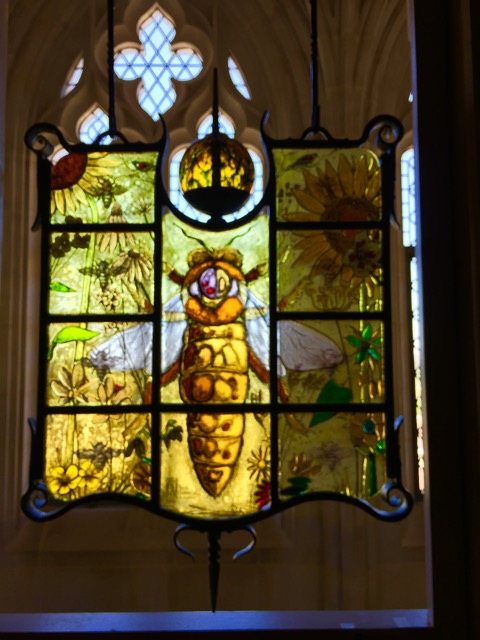
A stained glass window from The National Cathedral honoring bees.
The five bee hives on our cathedral are sometimes a lovely set of colonies on our roof, sometimes a political bouncing ball, sometimes a tool for power and control but always a source of rich, dark yellow honey.
After seven years of bee-keeping on a 19th century farm in New Hampshire, I know a lot about bees and a lot about communities. This is the problem with being so old.
Much ink has been spilled to wrestle the bees from place to place, people to people, power to power. They will soon be installed, temporarily in the Dominic Park gardens, near fresh, flowing water, across the front entrance of the cathedral’s doors across 14th street while we fix the roof and will be cared for by landscape, gardens and facilities leaders – as they should be. They will thrive under that leadership.
The irony of these near-silent, harmless, productive bees being such a political football is hard to miss. Bees sting when angry, produce lots of sweet honey when happy and make life on our planet possible by their engagement with the world. Never have I seen a non-human being so similar to humans.
Many religious traditions use bees as a primary symbol of community and often the queen and her colony have been used as a metaphor for God and God’s sentient beings on this planet.
I approach my annual vacation – a couple of weeks in an internet-less cabin on an Island off the coast of Maine (an affordable rest made possible by a generous church asking only that I preach and teach a bit.) I need this rest. It has been a hard year. But what I am learning about church and life is that people, like bees are lovely, most days. They don’t sting, most days. They produce sweet nectar, most days. And they even swarm and leave, sometimes. But they make the planet work. And they are to gardens what humans are to church – Christ-incarnate – making the church work, when they are at their best.

